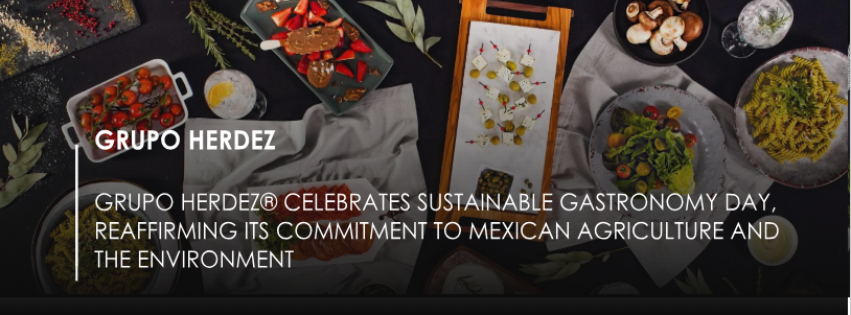Mexico City, June 17, 2025. Within the framework of Sustainable Gastronomy Day, Grupo Herdez® reaffirms its commitment to the sustainable development of Mexican agriculture through initiatives that ensure the quality of its products from their origin. Through sustainable and regenerative agriculture projects, it promotes strategies that converge on a single purpose: caring for natural resources, empowering farmers, and guaranteeing the quality of its agricultural raw materials.
Currently, more than 3,800 Mexican producers —92% belonging to small and medium-sized enterprises— are suppliers to Grupo Herdez®. In 2024, the Group acquired 134,081 tons of agricultural and beekeeping raw materials, of which 57.6% came from suppliers adhering to its Sustainable and Regenerative Agriculture Program (PASyR). This program ensures and monitors that cultivation is carried out under practices that reduce water usage, conserve soil nutrients, and preserve the biodiversity of agricultural fields.
This initiative has allowed for the implementation of sustainable techniques across more than 8,000 hectares, achieving savings of up to 60% in water consumption and productivity increases of up to 11% in crops such as tomatoes, corn, onions, and aromatic herbs.
Furthermore, suppliers obtain benefits such as reduced costs due to rational water use, reduced use of agrochemicals, production with less environmental impact, and increased productivity of their land. Through the implementation of sustainable practices, Grupo Herdez® suppliers not only produce quality ingredients for export standards, but also promote the sustainable transformation of Mexican agriculture and extend their impact to the country’s food industry.
Additionally, over the last two years, the Regenerative Wheat Harvests initiative has been integrated, impacting, on average, 3,400 hectares per harvest cycle, with the participation of more than 50 farmers.
This model promotes zero tillage, the use of drip irrigation systems, fertilization that improves soil quality, reduces nutrient loss, and increases the potential to capture atmospheric carbon to reduce CO2 emissions; it also promotes agroecological pest management.
In 2024, these crops with regenerative agriculture practices reduced CO2 emissions by up to 6.5%, shifting from a carbon footprint of: 3.1 to 2.9 tons CO2e/ha due to 4’R fertilization (the right source, at the right rate, at the right time, and in the right place).
These sustainable and regenerative agriculture actions are aligned with Grupo Herdez®’s Sustainability Strategy and the UN’s Sustainable Development Goals (SDGs), specifically: Zero Hunger (SDG 2), Decent Work and Economic Growth (SDG 8), Responsible Consumption and Production (SDG 12), and Life on Land (SDG 15).
Every time a consumer chooses a product from Herdez®, Del Fuerte®, and Yemina® —brands from the company’s portfolio— they are directly supporting Mexican farmers who are committed to sustainable practices. With these initiatives, the food company with the longest history in the country not only guarantees quality products but also contributes to a more responsible, resilient agri-food model aligned with the new demands of the conscious consumer.

